Remote Ready Biology Learning Activities has 50 remote-ready activities, which work for either your classroom or remote teaching.
Serendip is an independent site partnering with faculty at multiple colleges and universities around the world. Happy exploring!
 |
| AP Photo |
There is no way to guarantee well-being, safety, security, happiness. But we can get less wrong, learn from the past, not remake mistakes by which humans themselves worsen rather than lessen human vulnerability. It is a time to take the time to feel and reflect and think, to tell and listen to each others' stories, to commit ourselves anew to finding ways to tell our collective human story in a way from which no one feels estranged.
Forum, 12 September 2001
In the days since 11 September 2001 it has seemed ever clearer ... that the tragedy of that day was an expression of a deep estrangement of groups of humans from one another, an estrangement so deep and profound that some human beings felt able to kill other human beings, and justified in doing so by their own visions of what is right and good. That this has happened repeatedly in human history is no basis for accepting it now, and certainly not for continuing it. The historical record should, with any thought at all, provide overwhelming incentive to find ways to stop the repeating pattern, and clear evidence that the possible ways that come most quickly to mind simply do not work. Violence begets violence; it cannot but enhance rather than reduce the estrangement from which we all suffer.
We need to talk to and understand each other ... not to forgive, not even to persuade, but rather to allow to emerge from our different stories and ideas the needed broader human story in which all human beings feel they are involved and in which all play a meaningful and satisfying part. We need together to conceive new kinds of meaning, meaning which makes sense of all of our different experiences and gives all of us a common stake in the future development of humanity. What security there is to find in human life, the assurance that humans will not wreak horrors on one another, can, it seems to me, be found no other way. We are, individually and collectively, responsible for our lives, and we must accept the challenge of finding ways to make them meaningful for all of us. It is a daunting challenge, a journey into unknown territory, but one we must take. Together.
Forum, 18 September 2001

Forum, 30 September 2001
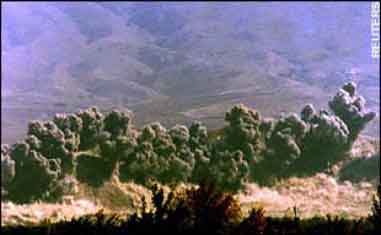 |
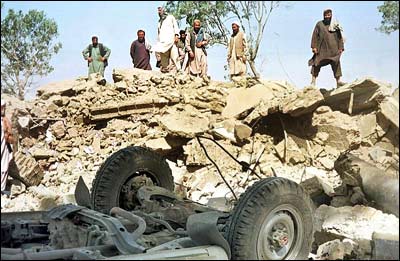 |
| www.nadir.org |
Forum, 9 September 2002
One strikes out at another, or a people or a nation, if and only if one is prepared to admit a total failure of the thoughtful mind to offer alternatives to the problem at hand. One may agree to go to war, but ONLY by first admitting intellectual and moral bankruptcy, an utter inability to conceive of alternative and preferable paths to the resolution of human conflicts.The issue is not whether one is going to engage in a "just" or "moral" war; it is whether one is so frightened as to be prepared to engage in a fundamentally irrational and immoral activity because one cannot think of nothing more promising to do.
Forum, 11 February 2003
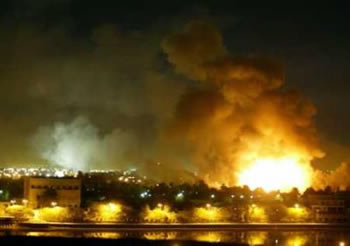 |
| Reuters |
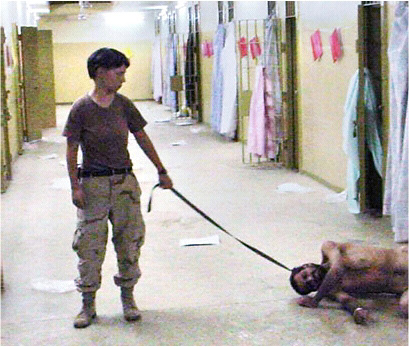 |
| Washington Post |
As a biologist, what the recent language adjustment brought to my mind is the "war on cancer", announced with great fanfare several decades ago. What has, of course, come to be understood (at least among biologists) is that one can't effectively wage a "war" on cancer. Cancer is not a single entity but rather a wide array of different disruptions in the growth patterns of the body. There is no single "invader"; indeed in many cases there is no invader at all. The only common feature is a disturbance of one or another element of the complex web of internal signaling which operates to keep different cells in the body working in coordinated ways with one another.
Susan Sontag, in her "Illness as Metaphor" (1978) wrote compellingly about the need for "an elucidation of ... metaphors, and a liberation from them", at least particular ones. What was on her mind was the problem of the constraints on the potentially doable which inevitably arise from the words we use to make sense of things, and the associated limited array of possible actions which the words represent and evoke.
Perhaps one can't wage a successful "war" on terrorism for the same reasons that one can't wage a successful war on cancer? What needs to be addressed is in both cases disguised by the metaphor. It has become clearer and clearer that there is in the case of terrorism, as in the case of cancer, no well-defined or single invader or enemy the destruction of whom will "fix the problem". There is instead a disturbance in the patterns of communication and understandings among human beings.
Such disturbances are not, and have never been, amenable to repair by military action. They may in fact not be amenable to solution by any of the "doables" in the repertoire of the traditional politician. Maybe we need ... the combination of politics, and language scholars, and scientists, the amalgam that can conceive the new potentially doable?
War is a Bad Metaphor, 10 June 2003
This is, of course, a day to remember ... and a day to share in the pain and sorrow of those who lives were tragically altered two years ago. My heart goes out to them. But it is also a time to reflect, on whether we have yet learned the most important lessons of that day, and to recommit ourselves to doing everything we can to reduce the likelihood of continuing and future human-generated tragedy, both in the United States and around the world. My sense is that we have yet to appreciate that the tragedy of 11 September was a consequence of the estrangement of human beings, and groups of human beings, from one another, and that the only route to enhanced security, for ourselves and others, is the reduction of such feelings of estrangement and the circumstances that give rise to them. As a nation, the United States is, I fear, pursuing instead a set of actions that exacerbates feelings of estrangement and puts us all at greater rather than lesser risk of the kind of human-generated tragedy represented by the events of 11 September. Those of us who recognize the mistake need today and tomorrow, like last year and the year before, to patiently and firmly argue the case for wiser actions. Discouraging as the past year has been, there is no alternative but to continue to clearly and publicly stand for a belief in the human capacity to get it less wrong.Forum, 11 September 2003
 |
| Gastner, Shalizi, Newman |
From the liberal democratic perspective, it was a mistake for the United States to respond to fundamentalism of one kind with fundamentalism of a different kind. It would be an equally serious mistake for those of us who espouse the liberal democratic perspective to respond to fundamentalism in our midst with our own version of fundamentalism, one that demonizes our fellow citizens who don't share the liberal democratic perspective. The need instead is to break the patterns of segregation that we have (consciously or unconsciously, deliberately or inadvertently) fallen into.
We need to find ways to make common cause with those whose perspectives are different from our own, to live in ways that are more fully engaged with them. It is along this path, and perhaps only along this path, that we can come to better understand why the liberal democratic perspective is not as appealing to them as it is to us. And it is along this path that we may be able, together, to make liberal democracy more appealing to all humans. Regardless, there is no other path to take if we are serious ourselves about our commitment to liberal democracy.
Forum, 4 November 2004
Maybe ideology should be left to the ideologists and the rest of us should get on with the business of exploring and sharing useful stories about those explorationsIntelligent Design and the Story of Evolution: No Need for Drawing Lines in the Sand, 4 September 2005
a new sort of direction for humanity, one in which individuals themselves become for themselves (and each other) the active agents responsible for not being "carried here and there by the winds of doctrine", and one where everyone benefits from their own distinctive explorations and the ongoing and different explorations of others.Fundamentalism and Relativism: Finding a New Direction, 20 April 2005
"I believe ..." is a good starting point, but should never be taken as an ending point, either for oneself or in one's sharing with others. As an ending point, "I believe ... " is at best a conversation stopper and at worst the origins of much of the suffering that humans wreak on one another ... We are better off pairing "I believe ... " with a healthy humility, to use it not to define what some ideal future should be but rather to help us imagine and create the new experiments and ways of thinking that avoid the errors of the past.The Perils and Potentials of "I Believe ...", 10 April 2006
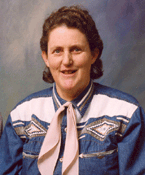 |
| templegrandin.com |
How I Think and Feel is Different, 29 August 2006
The events of September 11 2001 will not and should not be forgotten. Nor should those of the past five years that derive both from those events and from powerful cultural forces that gave rise to them and still persist. September 11 2001 was in many ways for many people a unique day of shock and tragedy. Hopefully, it is also a day that can serve to remind all humans of human problems that we have been wrestling with for decades, centuries, millenia, of the human capacity to create enormous suffering for other human beings and for ourselves. To the extent we recognize and accept that, the past five years, painful, frightening, and frustrating as they have been, can become a gateway through which we can all move in the direction of creating a new and more humane human culture.There are signs that increasing numbers of Americans are recognizing that American policy since September 11 2001 has been counter-productive, and this is encouraging if it reflects a wide-spread recognition that
The needed sort of cultural change is wide-spread and daunting but not in principle unachievable. It depends on individuals who are themselves willing to question and to learn from their own experiences as well as those of others, and on such individuals providing persistent and patient support and encouragement for others to do the same thing. And on a recognition that
Paul Grobstein, 11 September 2006
[an error occurred while processing this directive]